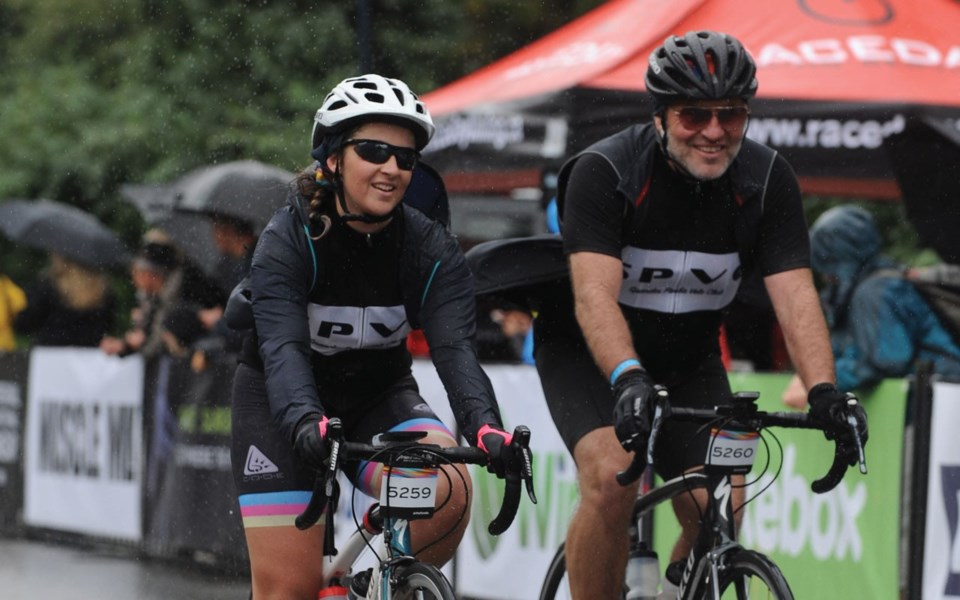In both her personal life and her career, Eleanor Roberts is a champion of active living.
The Vancouver-based kinesiologist rides her bike—including in a number of RBC GranFondo events—and also does yoga, plays soccer and serves as a personal trainer.
She kicked up her cycling in recent years after her dad, Glyn, was diagnosed with a heart condition, and because injuries prevented him from activities such as running, cycling was a way the two could be active together.
"We got bikes in 2017, in June. We hit the ground running. We did the Whistler Fondo (twice)," she said, noting the Levi's and Silicon Valley Fondos in California are also high on their list.
As an early riser and active commuter, Roberts often exercises in the morning, which is something she enjoys because it allows her to complete her daily allotment straightaway, but also because that's when she's more motivated.
"I think there's definitely a difference," she said. "You have more energy when you're in it (in the morning) and when you're in it at the end of the day, sometimes you get that fatigued feeling."
However, a new study which Roberts is participating in is investigating whether there is any risk associated with exercising that early in the day. The study, which features researchers from Vancouver Coastal Health, the University of British Columbia and SportCardiologyBC, will study 126 recreational and competitive athletes over a span of 10 years.
Dr. Saul Isserow, the director of the Vancouver General Hospital Centre for Cardiovascular Health and the director of Cardiology Services at UBC Hospital, explained that heart attacks generally occur when there is an underlying factor that is triggered. He added there is evidence suggesting that exercise may be one trigger for heart attacks, while a Massachusetts study of 2,000 people who died of sudden cardiac arrest found the patients' circadian rhythm was more varied in the morning.
"One of the triggers, we believe, for heart attacks may be exercise," Isserow said. "The paradox is that during the time that the person actually exercises, they're more at risk than if they were sitting on their deck-side for that time. But if they didn't exercise, for the 23 hours of the day that they're not exercising, they would be at higher risk if they didn't exercise for that one hour."
Isserow, the founder of SportCardiologyBC, said the study is not trying to "engender any fear in anyone;" he stressed the physical, psychological and emotional benefits of exercise, adding that the study is working to ensure that activity is done as safely as possible.
"It's all theory and supposition and extrapolation, so we are looking to see whether or not it can be the case," he said.
Isserow said participants, who exercise for at least 30 minutes three times per week and hit a target heart rate of between 60 and 70 per cent, will exercise at one time of day, and then exactly the opposite, done annually for the next 10 years. They will wear the Holter monitor for 24 hours to record the effects of exercise throughout the day. In particular, researchers will be looking for arrhythmia (irregular heartbeats) during the process, as it tends to be a common denominator in heart attacks.
As part of the study, participants complete a questionnaire, undergo an electrocardiogram and do a stress test before their workout.
"We're taking some people who are quite committed to keeping exercising for the next 10 years. They're supposedly free of disease; they don't think they have any heart disease," he said.
Isserow noted that the time-of-day element is somewhat oversimplified, as, for example, those working night shifts have a different circadian rhythm than typical nine-to-fivers. This study, he noted, studies daytime workers on traditional schedules.
For her part, Roberts has participated in other activity studies before, but they have ranged in length from one visit to two weeks. She's intrigued to see what the results bring in a decade and is comforted knowing her heart will be monitored closely in that time.
"It'll be super interesting, a really good comfort for me that I'm getting checked in on," she said. "It's a better place to be, for sure."




